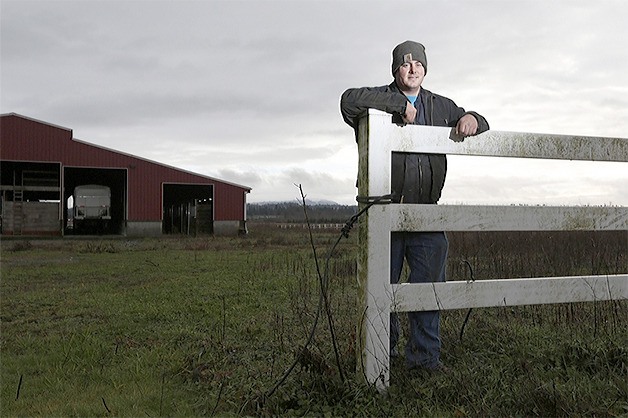By Kari Bray
kbray@heraldnet.com
ARLINGTON — A dirty, drooping banner on the side of a big red barn near the edge of the city advertises “New Homes and Lots” for sale.
It’s been there for nearly a decade, but it’s about to come down.
The lots aren’t for sale anymore. About 150 acres on the south side of Highway 530 had been platted and permitted as a new 15-house subdivision. One house was built and sold. Then the rest of the project was foreclosed on after the recession crippled the housing market.
Earlier this month, the Seattle-based conservation group Forterra bought the remaining 140 acres. A conservation easement is being put on the property to protect it as agricultural land and prevent any further development. Forterra plans to sell the acreage, which they’re calling Riverbend Farm, to a young, third-generation farmer who has been growing crops on the land while it was awaiting development.
ADVERTISEMENT
0 seconds of 0 secondsVolume 0%
Press shift question mark to access a list of keyboard shortcuts
Keyboard Shortcuts
Shortcuts Open/Close/ or ?
Play/PauseSPACE
Increase Volume↑
Decrease Volume↓
Seek Forward→
Seek Backward←
Captions On/Offc
Fullscreen/Exit Fullscreenf
Mute/Unmutem
Decrease Caption Size-
Increase Caption Size+ or =
Seek %0-9
The farmer, 32-year-old Andrew Albert, also manages and is part owner of a farm down the road from Riverbend. It’s about a quarter mile as the crow flies, he said. The 140 acres he’s buying from Forterra will be the first farmland that’s ever been solely his, though. His dad owns the majority of the stakes in the family farm.
Albert has been farming since he was a teen. As a freshman in high school, he used his dad’s equipment to harvest hay on a school property. A year after graduating, he was farming full time. He grows hay, corn, wheat, spinach and other vegetables.
Albert has big plans for Riverbend Farm. He’ll start by clearing out a field full of thick, tangled blackberry vines so he can make more room for his crops.
“This place, at one point, was completely covered in weeds,” he said. “I remember driving through that field and the thistles were taller than I was on my tractor.”
Riverbend is surrounded mostly by other farmland. Neighbors include the popular berry picking spot Biringer Farm and several pumpkin patches that bustle with activity in the fall.
The paved cul-de-sac, utility boxes and wells that were put in to prepare for development seem out of place among the fields, Forterra vice president Michelle Connor said.
“The conversion of property in the middle of farmland jeopardizes the rest of the farmland around it,” she said. “It also fundamentally changes the nature of the city of Arlington from having farmland at its door to having a subdivision.”
The Riverbend acreage belonged to the largest dairy in Arlington before it was divided up for development and then foreclosed. The property was scheduled to be auctioned off when Forterra inked a deal to buy it.
There’s a lot of risk in taking on the property, Connor said. Workers removed diesel and gasoline tanks buried in the ground to prepare for development. The work wasn’t properly documented so the state labeled the area as a brownfield, meaning it’s a possible contamination site. Forterra is working on getting that sorted out before selling to Albert, Connor said. None of their examinations have found any contamination but they need the state to confirm their findings.
“No farmer could step into that, so Forterra is kind of stepping into all the risk to protect this farmland,” Connor said.
The organization’s budget for acquiring the property and dealing with legal and environmental entanglements is $700,000, but that could go down as the organization works with the state to resolve concerns such as the brownfield designation. Forterra also had help from government and conservation groups to cover the costs of wiping out development rights and securing the acreage as farmland. Snohomish County Conservation Futures contributed $100,000, the Snohomish County Conservation District landed $50,000 from the Washington Conservation Commission and the city of Arlington contributed about $15,000.
“It’s a nice way to end the year, getting this property,” Connor said. “We feel really good about it. It was a tough hill to climb, but it was worth it.”
Forterra also is raising money to pay $30,000 in back taxes. They’d like to sell Albert a farm “with a clean bill of health,” Connor said.
Albert hopes to officially be the owner of Riverbend Farm by April 1. To him, the property represents solid ground to stand on and space to grow. He’d like to add new buildings, maybe a barn and silo. The farm he manages for his dad is mostly in the floodplain while Riverbend Farm has room to build on higher ground.
Owning a farm also gives him the ability to control the property’s future.
“It’s security in my business,” Albert said. “This is mine. I can farm this as long as I’m able.”
The average age of farmers in Snohomish County is 55, and Albert jokes that he’s dragging the average down. He wants to continue an agricultural legacy that stretches back to a family farm in Switzerland.
He knows it won’t be easy cleaning up the overgrown Riverbend property and transforming what was ready to become a neighborhood into fields of crops. Still, he’s hoping to have seeds in the ground in 2016.
“I like fixing things up,” Albert said. “Next spring, coming into Arlington is going to look a lot nicer.”








